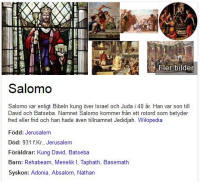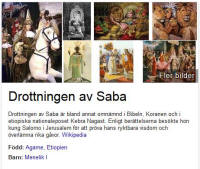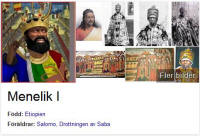Queen of Sheba (Drottningen av Saba)
Queen of Sheba är bland annat omnämnd i Bibeln, Koranen och i etiopiska nationaleposet Kebra Nagast. Enligt berättelserna besökte hon kung Salomo i Jerusalem för att pröva hans ryktbara visdom och överlämna rika gåvor.
Född: Agame, Etiopien
Barn: Menelik I
The Queen of Sheba, according to the biblical narrative, was a woman of great wealth, beauty, and power. Sheba, believed to be either in Ethiopia or Yemen by most biblical scholars, was a well-established city, and, although there is little evidence outside the Bible as to the nature of the monarchy and how it was established, it is clear that the Queen of Sheba ruled alone and was not enamored with the religions in her own land.
The Queen of Sheba traveled to Jerusalem as she had “heard about the fame of Solomon and his relationship to the LORD, [and] came to test Solomon with hard questions” (1 Kings 10:1). As God had granted Solomon the gift of wisdom (1 Kings 3:5–12), “nothing was too hard for the king to explain to her” (1 Kings 10:3). After a meal together, the Queen of Sheba declares how impressed she is with Solomon’s answers, hospitality, and the reputation that preceded him. The story ends with an exchange of resources and the Queen of Sheba returning “with her retinue to her own country” (1 Kings 10:13).
Sources outside the Bible suggest that the Queen of Sheba conceived a child in secret with King Solomon, while some Bible commentators have suggested that the nameless woman in the Song of Solomon is the Queen of Sheba (with the man being King Solomon). Both are speculative and, while interesting, cannot be declared factual. Whether she has any relation to the “Sheba” mentioned in Genesis 10:7 and 28, or if she was the ancestor of “Candace, queen of the Ethiopians” (Acts 8:27), is, again, open to speculation.
The Queen of Sheba is mentioned again in the New Testament, by an alternative title, the Queen of the South (Matthew 12:42; Luke 11:31). Jesus refers to her, reaffirming her historical personage, as a means to illustrate the point that, despite being originally pagan in belief and Gentile in race, the Queen of Sheba recognized the truth and reality of God, unlike the religious leaders who opposed Jesus. As such, they would be condemned for their ignorant and defiant nature.
Two lessons can be learned from the story of the Queen of Sheba. First, like King Solomon, believers are to show evidence of God’s favor in their lives, whatever their role, profession, or environment. Second, the reputation of believers should precede them by their godly words and actions, for we are “Christ’s ambassadors” (2 Corinthians 5:20).
















